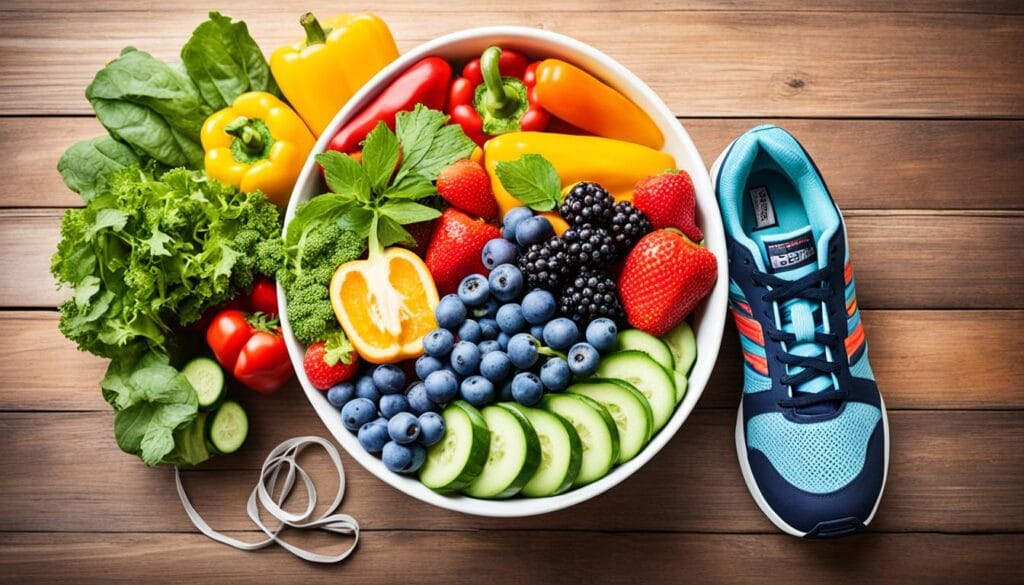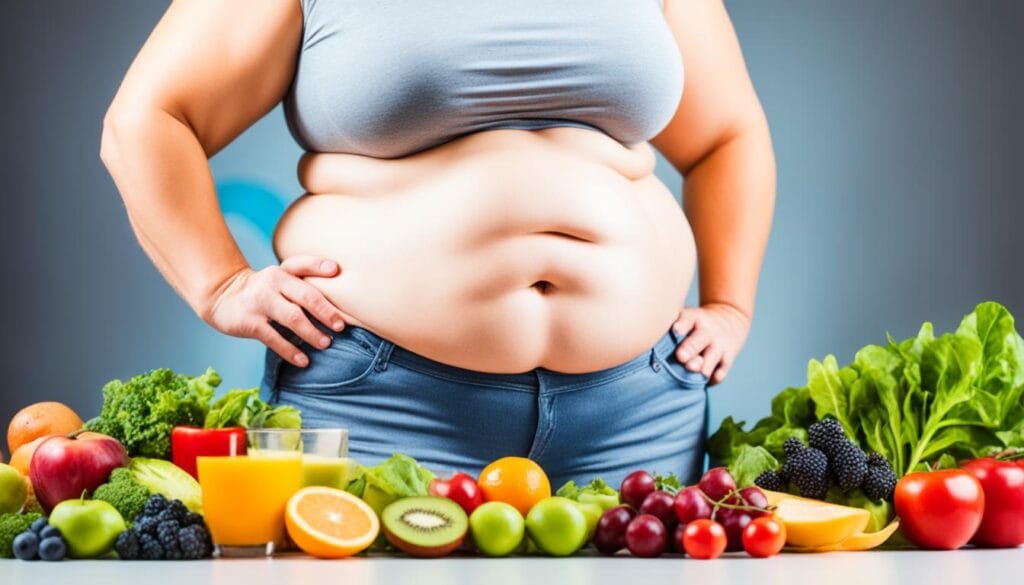Lose weight faster postpartum by incorporating these 10 superfoods into your diet. Packed with essential nutrients, they support weight loss and boost overall health.
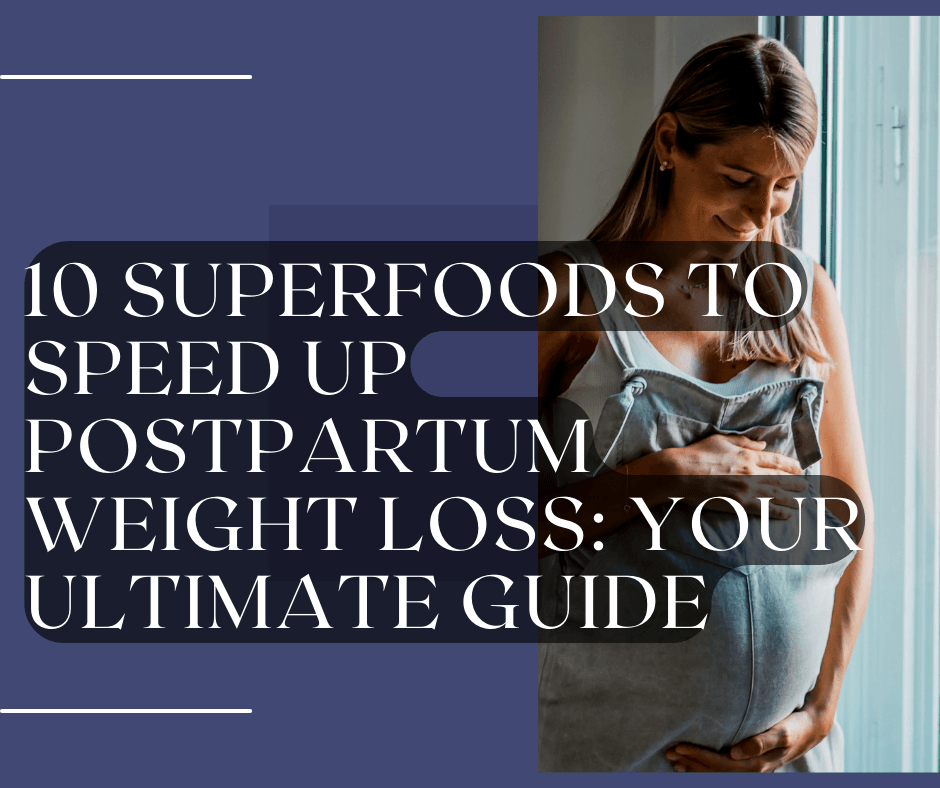
Losing weight after having a baby can be challenging, but it doesn’t have to be overwhelming. By adding these superfoods to your diet, you can nourish your body, support your metabolism, and shed those extra pounds more effectively. Here are the top 10 superfoods to speed up postpartum weight loss, along with tips on how to incorporate them into your daily routine.
1. Avocados
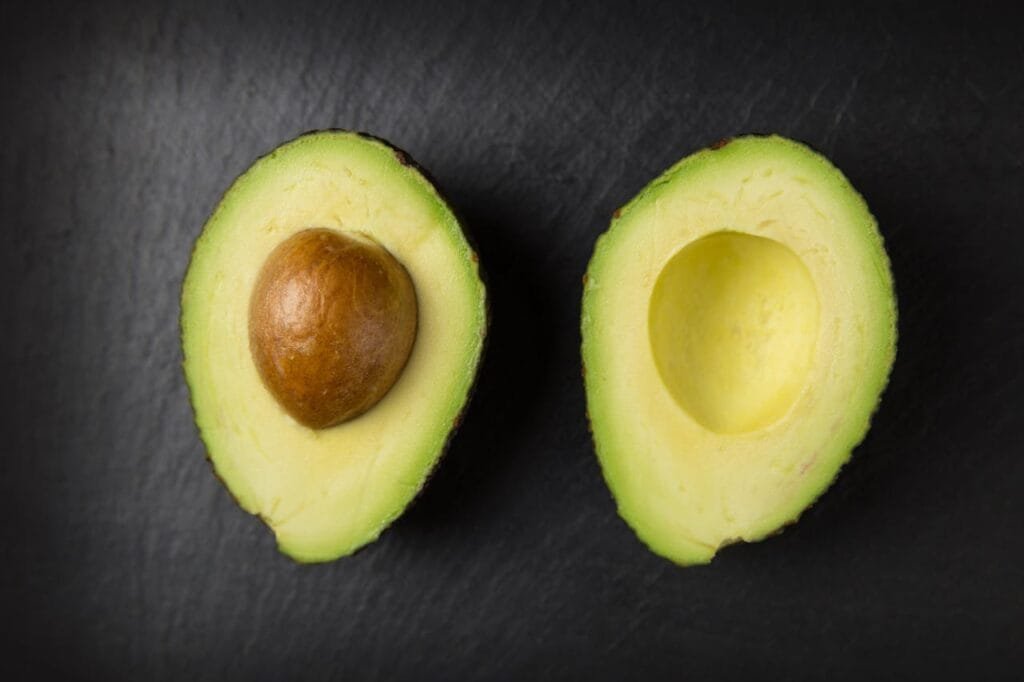
As a new mom, I discovered that avocados were a game-changer in my postpartum journey. Here’s why I believe every new mother should consider adding this creamy superfood to their diet:
Nutrient-Dense Calories
When you’re running on little sleep and your body is recovering from childbirth, you need efficient nutrition. Avocados pack a punch in this department. I found that adding half an avocado to my breakfast smoothie or lunch salad kept me full for hours, reducing the temptation to snack on less nutritious options.
Key nutrients in avocados:
- Healthy monounsaturated fats
- Fiber
- Potassium
- Folate
- Vitamins K, C, and B6
Supports Breastfeeding
For breastfeeding moms, avocados are particularly beneficial. The healthy fats in avocados may help with the absorption of fat-soluble vitamins in breast milk. Plus, the folate content supports your baby’s development.
I noticed that including avocado in my diet seemed to help maintain my milk supply. While this is anecdotal, many lactation experts recommend avocados as a supportive food for breastfeeding moms.
Boosts Energy and Mood
The combination of healthy fats and B-vitamins in avocados can provide a steady source of energy. This was crucial for me during those sleep-deprived early months. The potassium in avocados also helps maintain electrolyte balance, which can help combat fatigue.
Moreover, avocados contain tryptophan, a precursor to serotonin, which may help support mood regulation – something many new moms struggle with.
Supports Healthy Weight Loss
While it might seem counterintuitive to eat a high-fat food for weight loss, the healthy fats in avocados can actually support your postpartum weight loss goals. The fiber and fat content helps keep you feeling full, potentially reducing overall calorie intake.
I found that adding avocado to my meals helped curb cravings and prevented overeating. It’s important to note that moderation is key – aim for about half an avocado per day.
Versatile and Easy to Prepare
As a busy new mom, I appreciated how easy it was to incorporate avocados into my diet. From simply spreading it on toast to adding it to smoothies or salads, there are countless ways to enjoy this superfood.
Quick Avocado Ideas for New Moms:
- Mash on whole grain toast for a quick breakfast
- Blend into smoothies for added creaminess
- Dice into salads for a satisfying lunch
- Use as a spread on sandwiches instead of mayo
- Make a quick guacamole for a nutritious snack
2. Greek Yogurt
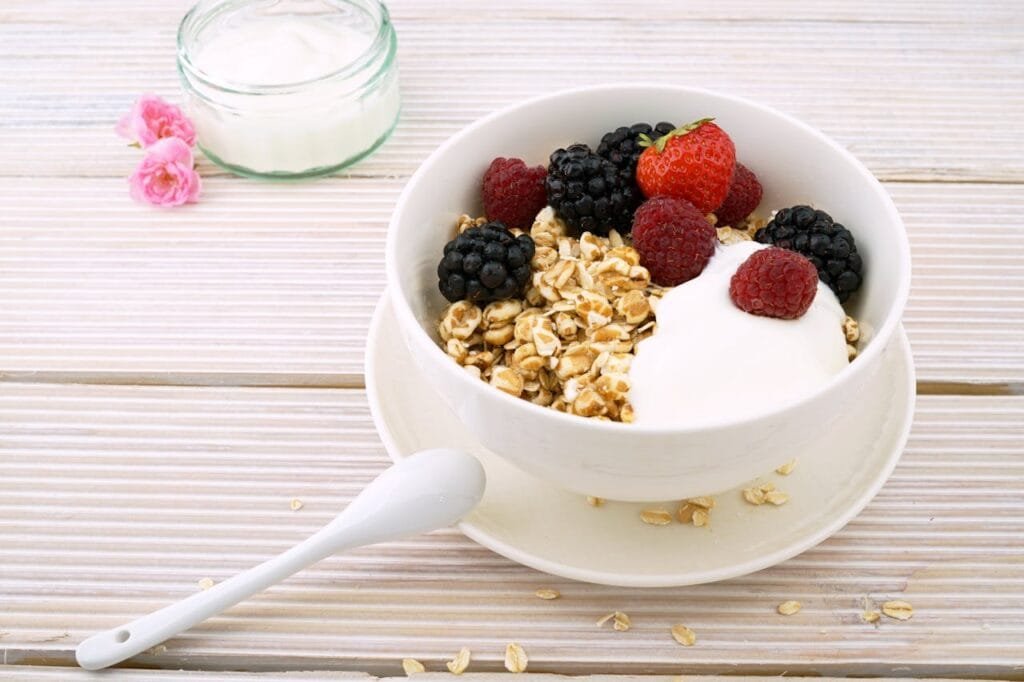
As a new mom, I quickly learned that Greek yogurt was more than just a tasty snack – it became a staple in my postpartum diet. Here’s why I believe Greek yogurt is a superfood that every new mother should consider:
High-Quality Protein Source
Greek yogurt is a protein powerhouse. In my experience, consuming adequate protein was crucial for recovery after childbirth and for maintaining muscle mass during weight loss. A typical 6-ounce serving of Greek yogurt contains about 15-20 grams of protein, nearly double that of regular yogurt.
I found that having a serving of Greek yogurt as a mid-morning snack or as part of my breakfast helped keep me full and satisfied, reducing the likelihood of unhealthy snacking later in the day.
Supports Bone Health
Greek yogurt is an excellent source of calcium, which is crucial for maintaining bone health. This is particularly important for breastfeeding moms, as your body uses calcium to produce breast milk. I made sure to include Greek yogurt in my diet to help protect my bone density during this demanding time.
Probiotics for Gut Health
Many Greek yogurts contain probiotics, which are beneficial bacteria that support gut health. After pregnancy and childbirth, which can disrupt your digestive system, I found that incorporating probiotic-rich foods like Greek yogurt helped regulate my digestion and boosted my overall well-being.
Versatile and Convenient
As a new mom with limited time and energy, I appreciated how versatile Greek yogurt was. Here are some quick and easy ways I incorporated it into my meals:
- Used it as a base for protein-packed smoothies
- Mixed it with herbs for a healthy vegetable dip
- Topped it with fruits and nuts for a quick breakfast or snack
- Used it as a substitute for sour cream in recipes
- Added it to soups or curries for extra creaminess and protein
Supports Weight Loss Goals
The high protein content of Greek yogurt can be beneficial for weight loss. Protein helps you feel full and satisfied, potentially reducing overall calorie intake. Additionally, some studies suggest that the calcium in dairy products like Greek yogurt may aid in weight loss.
I found that replacing less nutritious snacks with Greek yogurt helped me manage my calorie intake while still feeling satisfied.
Nutrient-Rich for Breastfeeding Moms
For breastfeeding moms, Greek yogurt provides essential nutrients that support both you and your baby. It’s rich in:
- B vitamins for energy
- Potassium for fluid balance
- Iodine for thyroid function
I noticed that including Greek yogurt in my diet seemed to help maintain my energy levels during those demanding early months of motherhood.
Low in Lactose
If you’re someone who has trouble digesting lactose, Greek yogurt might still be an option. The straining process used to make Greek yogurt removes much of the lactose, making it easier to digest for many people who are lactose intolerant.
Remember, while Greek yogurt can be a healthy addition to your postpartum diet, it’s important to choose varieties without added sugars. Always read the label and opt for plain Greek yogurt, which you can sweeten naturally with fruits or a drizzle of honey if desired.
3. Berries

As a new mom, I discovered that berries were not just a delicious snack, but a powerful ally in my postpartum journey. Here’s why I believe every new mother should consider adding these colorful gems to their diet:
Packed with Antioxidants
Berries are antioxidant powerhouses. During my postpartum recovery, I learned that these antioxidants help combat oxidative stress and inflammation in the body. This is crucial for healing and overall health after giving birth.
Key antioxidants in berries:
- Anthocyanins
- Quercetin
- Ellagic acid
- Resveratrol
Low in Calories, High in Nutrients
When you’re trying to lose baby weight, every calorie counts. I found berries to be the perfect snack – satisfyingly sweet, but low in calories. A cup of mixed berries typically contains:
- Only 50-85 calories
- 3-8 grams of fiber
- High amounts of vitamin C
- Good source of manganese and vitamin K
Boosts Immune System
The high vitamin C content in berries is excellent for boosting the immune system. As a new mom, I was grateful for any extra defense against illness, especially when sleep was in short supply.
Supports Breastfeeding
- Hydration: Berries have high water content, supporting overall hydration.
- Nutrient transfer: The vitamins and minerals in berries can enrich breast milk.
- Energy boost: The natural sugars provide a quick, healthy energy source.
I noticed that snacking on berries during late-night feeding sessions helped keep me alert without resorting to caffeine.
Aids in Postpartum Weight Loss
Berries were a key part of my postpartum weight loss strategy:
- Low in calories
- High in fiber, promoting fullness
- Natural sweetness helps curb sugar cravings
I found that adding a handful of berries to my breakfast or as an afternoon snack helped me stay on track with my nutrition goals without feeling deprived.
Versatile and Convenient
As a busy new mom, I appreciated how easy it was to incorporate berries into my diet:
- Add to oatmeal or cereal for breakfast
- Blend into smoothies
- Top yogurt for a quick snack
- Mix into salads for a sweet twist
- Eat by the handful when you need a quick energy boost
May Help Combat Postpartum Blues
Some studies suggest that the antioxidants in berries may have mood-boosting properties. While more research is needed, I found that the act of treating myself to these colorful, flavorful fruits often gave me a psychological boost during challenging days.
Supports Skin Health
The antioxidants in berries, particularly vitamin C, support collagen production and overall skin health. As my body was recovering from pregnancy and childbirth, I felt that including berries in my diet contributed to faster healing and helped my skin regain its elasticity.
Remember, while berries are incredibly nutritious, they should be part of a balanced diet. Always wash them thoroughly before eating, especially when breastfeeding. If you have any concerns about your diet or are experiencing any unusual symptoms, consult with your healthcare provider.
4. Leafy Greens (Spinach, Kale)

As a new mom, I quickly learned that leafy greens like spinach and kale were my secret weapons for postpartum recovery and weight loss. Here’s why I made sure to include these nutrient-dense powerhouses in my daily meals:
Nutrient Density without Excess Calories
One of the things I love most about leafy greens is how many nutrients they pack into so few calories. This makes them perfect for postpartum weight loss. I found I could eat large, satisfying portions without worrying about calorie overload.
Key nutrients in spinach and kale:
- Vitamins A, C, E, K
- Folate
- Iron
- Calcium
- Magnesium
- Potassium
Iron Boost for Energy
After giving birth, many women experience iron deficiency, which can lead to fatigue. Both spinach and kale are excellent sources of iron. I noticed a significant boost in my energy levels when I started incorporating more of these greens into my diet.
Pro tip: Pair your leafy greens with vitamin C-rich foods like citrus fruits to enhance iron absorption.
Calcium for Bone Health
Leafy greens, especially kale, are rich in calcium. This is crucial for maintaining bone health, particularly if you’re breastfeeding. I made sure to include plenty of leafy greens to support my calcium needs without relying solely on dairy products.
Folate for Recovery and Baby’s Health
Folate is essential for cell repair and growth, making it vital for postpartum recovery. If you’re breastfeeding, it’s also crucial for your baby’s development. I found peace of mind knowing that my leafy green intake was supporting both my recovery and my baby’s health.
Fiber for Digestive Health and Fullness
The fiber in leafy greens helped regulate my digestion, which can be a bit unpredictable postpartum. Additionally, fiber-rich foods kept me feeling full longer, which was great for managing my appetite during weight loss.
Versatility in Meal Prep
As a busy new mom, I appreciated how easy it was to incorporate leafy greens into almost any meal. Here are some quick ideas I relied on:
- Blend into smoothies for a nutrient boost
- Use as a base for hearty salads
- Sauté as a quick side dish
- Add to soups and stews for extra nutrients
- Use large leaves as wraps for a low-carb option
Hydration Support
Staying hydrated is crucial postpartum, especially if you’re breastfeeding. Leafy greens have high water content, contributing to your overall hydration. I found this particularly helpful in the early days when I was focused on establishing my milk supply.
Mood-Boosting Properties
The folate in leafy greens isn’t just for physical health – it also plays a role in serotonin regulation, which can help support a positive mood. As a new mom dealing with hormonal changes, I found that prioritizing leafy greens in my diet seemed to help stabilize my mood.
Remember, while leafy greens are incredibly beneficial, it’s important to wash them thoroughly before consumption. If you’re concerned about your iron levels or any other nutritional needs, always consult with your healthcare provider.
5. Quinoa
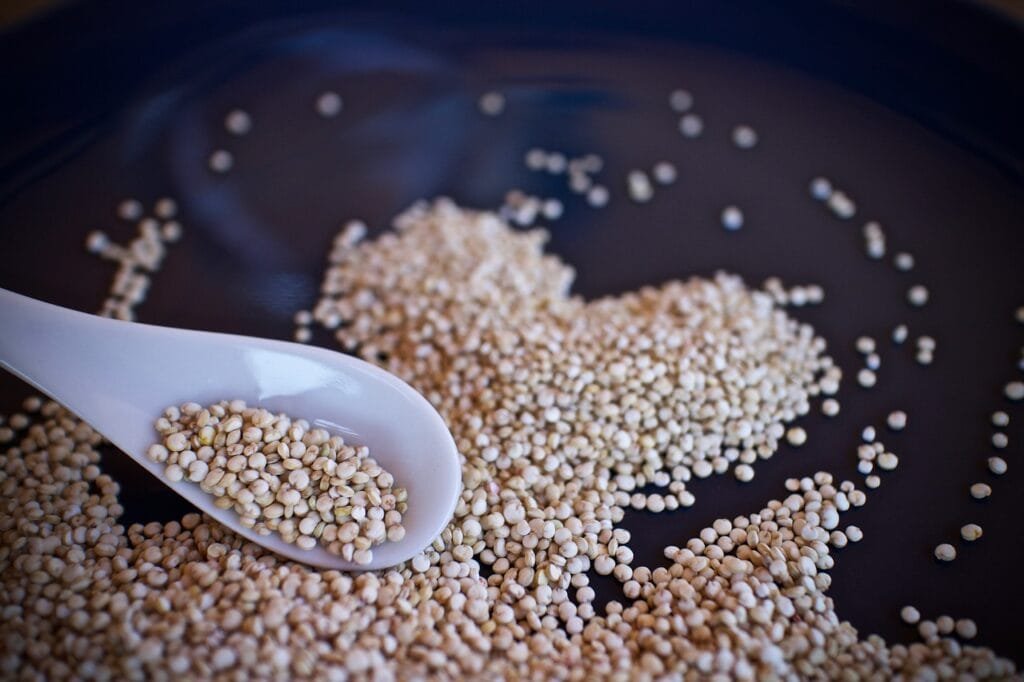
Quinoa is a nutritional powerhouse that can play a significant role in supporting postpartum weight loss. Here are some of the key benefits of incorporating quinoa into your diet:
High Protein Content
Quinoa is a complete protein, meaning it contains all nine essential amino acids that the body cannot produce on its own. This high protein content helps in muscle repair and growth, which is crucial for maintaining a healthy metabolism and burning calories efficiently.
Rich in Fiber
Fiber is essential for weight loss because it helps keep you feeling full longer, reducing overall calorie intake. Quinoa is high in dietary fiber, which aids in digestion and helps regulate blood sugar levels, preventing spikes and crashes that can lead to overeating.
Low Glycemic Index
Quinoa has a low glycemic index, meaning it releases energy slowly and helps maintain stable blood sugar levels. This steady energy release prevents hunger pangs and reduces the likelihood of unhealthy snacking between meals.
Packed with Nutrients
Quinoa is rich in vitamins and minerals such as magnesium, iron, B vitamins, and antioxidants. These nutrients support overall health and wellbeing, which is especially important during the postpartum period when the body is recovering from childbirth.
Gluten-Free
For those with gluten sensitivities or celiac disease, quinoa is an excellent gluten-free alternative to traditional grains. It provides similar benefits without causing digestive issues associated with gluten.
Versatile and Easy to Prepare
Quinoa is incredibly versatile and can be incorporated into a variety of dishes, from salads and soups to breakfast bowls and side dishes. Its ease of preparation makes it a convenient and nutritious addition to your diet.
Boosts Metabolism
The combination of protein, fiber, and essential nutrients in quinoa helps boost metabolism, making it easier to burn calories and lose weight. A healthy metabolism is key to effective weight management.
How to Incorporate Quinoa into Your Diet
- Quinoa Salad: Mix cooked quinoa with diced vegetables, herbs, and a light vinaigrette for a refreshing and filling salad.
- Breakfast Bowl: Combine quinoa with almond milk, fruits, and nuts for a nutritious breakfast option.
- Stuffed Peppers: Use quinoa as a filling for stuffed peppers along with beans, vegetables, and spices.
- Quinoa Soup: Add quinoa to soups and stews for added texture and protein.
6. Oats

High in Fiber
Oats are packed with dietary fiber, particularly beta-glucan, which is known for its ability to promote a feeling of fullness. This can help control hunger and reduce overall calorie intake, making it easier to manage weight postpartum. Fiber also aids in digestion and helps maintain a healthy digestive system, which is crucial during the postpartum period.
Stabilizes Blood Sugar Levels
The complex carbohydrates in oats are digested slowly, leading to a gradual release of glucose into the bloodstream. This helps stabilize blood sugar levels, preventing spikes and crashes that can lead to cravings and overeating. Maintaining steady blood sugar levels is essential for weight management and overall health.
Nutrient-Dense
Oats are rich in essential nutrients, including vitamins (such as B vitamins), minerals (such as iron, magnesium, and zinc), and antioxidants. These nutrients support overall health and recovery during the postpartum period. A well-nourished body is more efficient at burning fat and maintaining a healthy weight.
Boosts Metabolism
The high protein content in oats can help boost metabolism by increasing the body’s energy expenditure. Protein also helps in muscle repair and growth, which is essential for new mothers looking to regain their strength and fitness postpartum. A higher metabolic rate can aid in more effective weight loss.
Easy to Prepare and Versatile
Oats are incredibly easy to prepare and can be incorporated into various meals. Whether you prefer them as a warm bowl of porridge, overnight oats, or added to smoothies and baked goods, oats offer versatility that fits into a busy postpartum schedule. This convenience ensures that you can consistently include this superfood in your diet without much hassle.
Low in Calories
Oats are relatively low in calories, especially considering their high nutritional value. This makes them an excellent food choice for weight loss, as you can consume a satisfying portion without consuming excessive calories. Pairing oats with other nutrient-dense foods like fruits and nuts can create a balanced and filling meal that supports your weight loss goals.
Promotes Healthy Lactation
For breastfeeding mothers, oats are believed to help in milk production. While scientific evidence is limited, many lactating women find that consuming oats supports their milk supply. Ensuring adequate milk production while managing weight loss can be a delicate balance, and oats can play a beneficial role in this process.
Supports Heart Health
Oats contain heart-healthy compounds, including soluble fiber and antioxidants, which can help lower cholesterol levels and improve cardiovascular health. A healthy heart is vital for overall well-being and can support your weight loss efforts by enabling more effective physical activity and energy levels.
How to Incorporate Oats into Your Diet:
- Overnight Oats: Prepare a jar of overnight oats with almond milk, chia seeds, and fresh berries.
- Oatmeal Porridge: Cook oats with water or milk and top with fruits, nuts, and a drizzle of honey.
- Smoothie Booster: Add a handful of oats to your morning smoothie for extra fiber and nutrients.
- Baked Goods: Incorporate oats into muffins, cookies, or homemade granola bars for a nutritious snack.
7. Nuts and seeds
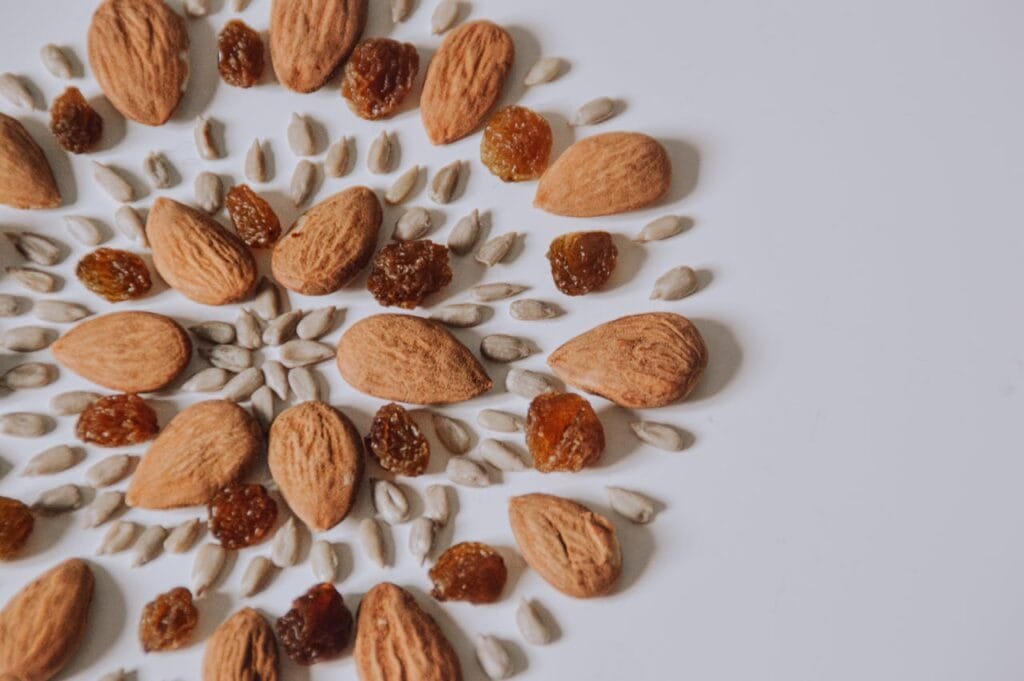
Nuts and seeds are nutritional powerhouses that can play a significant role in postpartum weight loss. Here’s why they are so beneficial:
Rich in Healthy Fats
Nuts and seeds are high in healthy fats, particularly monounsaturated and polyunsaturated fats. These fats are essential for maintaining overall health and can help you feel satiated, reducing the likelihood of overeating unhealthy snacks. Healthy fats are also crucial for hormone production, which is particularly important during the postpartum period.
High in Protein
Both nuts and seeds are excellent sources of plant-based protein. Protein is vital for muscle repair and growth, which is particularly important if you are engaging in postpartum exercise routines. Protein also has a high thermic effect, meaning your body burns more calories digesting it compared to fats or carbohydrates, which can aid in weight loss.
Rich in Fiber
The fiber content in nuts and seeds helps to keep you full longer, aiding in appetite control and reducing overall calorie intake. Fiber also supports digestive health, which can sometimes be disrupted during the postpartum period.
Nutrient Dense
Nuts and seeds are packed with essential vitamins and minerals such as vitamin E, magnesium, zinc, and selenium. These nutrients support overall health and can help address any deficiencies that might arise after childbirth.
Blood Sugar Regulation
The combination of healthy fats, protein, and fiber in nuts and seeds helps to stabilize blood sugar levels. Stable blood sugar levels can prevent energy crashes and reduce cravings for sugary and high-carb foods, which can contribute to weight gain.
Convenient and Versatile
Nuts and seeds are easy to incorporate into your diet. They make a convenient snack that can be enjoyed on the go, added to salads, sprinkled over yogurt, or blended into smoothies. Their versatility makes it easy to add them to a variety of meals and snacks.
Antioxidant Properties
Many nuts and seeds contain antioxidants, which help to combat oxidative stress and inflammation. This can be particularly beneficial during the postpartum period when your body is recovering from the stresses of childbirth.
How to Incorporate Nuts and Seeds into Your Diet
- Snack on Them Raw: A handful of almonds, walnuts, or sunflower seeds makes for a quick and satisfying snack.
- Add to Salads: Sprinkle chia seeds, flaxseeds, or chopped nuts over your salads for added crunch and nutrition.
- Blend into Smoothies: Add a tablespoon of nut butter or a mix of seeds to your morning smoothie for a protein boost.
- Use as Toppings: Sprinkle nuts and seeds over yogurt, oatmeal, or cereal.
- Baking: Incorporate nuts and seeds into your baking recipes, such as muffins, bread, and energy bars.
Personal Tip:
I keep a small bag of mixed nuts and seeds in my purse for a quick and satisfying snack on the go. It helps me stay energized and reduces the temptation to reach for less healthy options.
8. Salmon

High Protein Content
Why It Matters: Salmon is rich in high-quality protein, which is essential for muscle repair and growth. During the postpartum period, your body needs extra protein to recover from childbirth and support overall health.
Impact on Weight Loss: Protein helps to increase satiety, reducing overall calorie intake by keeping you fuller for longer. This can help prevent overeating and support weight loss.
Omega-3 Fatty Acids
Why It Matters: Salmon is an excellent source of omega-3 fatty acids, particularly EPA and DHA. These healthy fats are crucial for brain health, reducing inflammation, and supporting cardiovascular health.
Impact on Weight Loss: Omega-3 fatty acids can help regulate metabolism and improve fat oxidation. They also reduce inflammation, which can be beneficial for overall body function and weight management.
Low in Calories
Why It Matters: Despite being nutrient-dense, salmon is relatively low in calories compared to other protein sources. This makes it a great option for those looking to manage their weight without sacrificing essential nutrients.
Impact on Weight Loss: Including low-calorie, high-nutrient foods like salmon in your diet can help you maintain a calorie deficit while still providing your body with the nutrients it needs.
Supports Metabolism
Why It Matters: Salmon contains several nutrients that support metabolic function, including vitamin D, B vitamins, and selenium. These vitamins and minerals play key roles in energy production and metabolism.
Impact on Weight Loss: A well-functioning metabolism can help your body efficiently process nutrients and burn calories, aiding in weight loss efforts.
Enhances Mood and Mental Health
Why It Matters: Postpartum periods can be challenging emotionally, and omega-3 fatty acids in salmon are known to support mental health and mood stabilization.
Impact on Weight Loss: Improved mood and mental well-being can help reduce stress-related eating and promote healthier lifestyle choices, contributing to overall weight management.
Reduces Inflammation
Why It Matters: The postpartum period can involve inflammation as your body heals from childbirth. Omega-3 fatty acids in salmon have anti-inflammatory properties that can help reduce this inflammation.
Impact on Weight Loss: Reducing inflammation can improve overall bodily functions and support a healthier weight loss process.
Versatile and Delicious
- Why It Matters: Salmon is a versatile ingredient that can be prepared in various ways, making it easy to include in different meals.
- Impact on Weight Loss: Enjoying a variety of healthy meals can help you stick to a balanced diet and avoid monotony, making it easier to maintain healthy eating habits.
How to Incorporate Salmon into Your Diet:
- Grill or Bake: Try grilling or baking salmon with a sprinkle of herbs and a squeeze of lemon for a simple and delicious meal.
- Salads: Add flaked salmon to salads for a protein boost and added flavor.
- Wraps and Sandwiches: Use salmon in wraps or sandwiches for a nutritious lunch option.
- Soups and Stews: Incorporate salmon into soups or stews for a hearty and satisfying dish.
Personal Tip: One of my favorite ways to enjoy salmon is by baking it with a glaze of honey and mustard. It’s a quick and flavorful meal that pairs well with a side of steamed vegetables or quinoa.
9. Sweet Potatoes

Sweet potatoes are a fantastic addition to a postpartum diet for several reasons. Here’s how they can help with weight loss and overall health after giving birth:
High in Fiber
Sweet potatoes are rich in dietary fiber, which aids in digestion and helps you feel full longer. Fiber slows down the digestion process, preventing spikes in blood sugar levels and reducing hunger, which can help you manage portion sizes and reduce overall calorie intake.
Example: A medium-sized sweet potato contains about 4 grams of fiber. Including it in your meals can help control hunger and reduce the likelihood of overeating.
Low in Calories
Despite being nutrient-dense, sweet potatoes are relatively low in calories. This makes them an excellent choice for those looking to lose weight without sacrificing essential nutrients.
Example: A medium sweet potato has around 100 calories, making it a satisfying and healthy choice for any meal.
Rich in Vitamins and Minerals
Sweet potatoes are packed with essential vitamins and minerals, including vitamin A, vitamin C, manganese, and potassium. These nutrients support overall health, help with postpartum recovery, and maintain energy levels.
- Vitamin A: Supports immune function and skin health.
- Vitamin C: Aids in collagen production and helps with wound healing.
- Potassium: Helps maintain fluid balance and reduces bloating.
- Manganese: Supports metabolism and bone health.
Example: Just one medium sweet potato provides over 400% of the daily recommended intake of vitamin A.
Natural Sweetness
Sweet potatoes offer a natural sweetness that can satisfy sugar cravings without resorting to processed sweets. Their natural sugars provide a healthier alternative to sugary snacks and desserts.
Example: Roasted sweet potato wedges can serve as a delicious and nutritious substitute for fries.
Supports Metabolism
The complex carbohydrates in sweet potatoes provide a steady release of energy. This helps stabilize blood sugar levels and supports a healthy metabolism, which is crucial for effective weight loss.
Example: Eating sweet potatoes as part of a balanced meal can provide sustained energy throughout the day, making it easier to stay active and support weight loss goals.
Versatile and Easy to Prepare
Sweet potatoes are incredibly versatile and can be used in various recipes. Whether baked, mashed, or added to soups and stews, they can easily fit into different meals and cuisines, making them a convenient option for busy new moms.
Example: You can prepare sweet potato mash with a bit of cinnamon for a comforting side dish or bake sweet potato slices for a quick and easy snack.
Incorporating Sweet Potatoes into Your Diet
Simple Recipes:
- Roasted Sweet Potato Wedges: Cut sweet potatoes into wedges, toss with olive oil and spices, and roast until crispy.
- Sweet Potato Mash: Boil or bake sweet potatoes, then mash with a bit of butter and seasoning.
- Sweet Potato Soup: Blend cooked sweet potatoes with vegetable broth and spices for a creamy, nutritious soup.
Personal Tip: I find that adding a little cinnamon and a touch of honey to sweet potato dishes can enhance their natural sweetness without adding excessive calories.
10. Green Tea

Boosts Metabolism
Green tea is renowned for its ability to enhance metabolic rate. This is largely due to its high concentration of catechins, particularly epigallocatechin gallate (EGCG). These antioxidants help to increase the rate at which your body burns calories, which can aid in weight loss. Studies have shown that drinking green tea regularly can lead to a modest reduction in body weight and body fat.
Aids in Fat Oxidation
The catechins in green tea also play a crucial role in fat oxidation. They help to break down fat cells and make them more available for use as energy. This means that not only does green tea help you burn more calories, but it also helps to target and reduce fat, particularly in the abdominal area, which is often a challenge during postpartum recovery.
Regulates Blood Sugar Levels
Green tea helps to stabilize blood sugar levels by improving insulin sensitivity. This can prevent spikes and crashes in blood sugar that often lead to unhealthy cravings and overeating. For new mothers, maintaining stable blood sugar levels is important for managing energy levels and overall well-being.
Supports Digestive Health
Green tea has been shown to have a positive impact on digestive health. It promotes the growth of healthy gut bacteria and improves digestion. A healthy digestive system can lead to better nutrient absorption and a more efficient metabolism, which supports weight loss efforts.
Provides Antioxidants
The antioxidants in green tea help to reduce inflammation and oxidative stress in the body. This can be particularly beneficial postpartum, as your body undergoes significant changes and recovery. Reducing inflammation supports overall health and can improve your body’s ability to lose weight.
Hydrates and Detoxifies
Staying hydrated is key to weight management, and green tea can help with this. It is a hydrating beverage that also supports the body’s natural detoxification processes. Proper hydration and detoxification are essential for maintaining a healthy metabolism and promoting weight loss.
Reduces Stress
Postpartum can be a stressful time, and high stress levels can lead to weight gain or difficulty losing weight. Green tea contains L-theanine, an amino acid that has calming effects and can help reduce stress. Managing stress levels can aid in weight loss and improve overall well-being.
How to Incorporate Green Tea into Your Routine
- Daily Cup: Start your day with a cup of green tea or enjoy it as an afternoon pick-me-up.
- Iced Tea: Make a refreshing iced green tea with a splash of lemon for a cool, hydrating drink.
- Smoothies: Add a scoop of matcha powder (a concentrated form of green tea) to your smoothies for an extra boost.
Thank you for reading! By incorporating these superfoods into your diet, you can support your postpartum weight loss journey and nourish your body with essential nutrients. For more tips and healthy recipes, check out our related posts.
